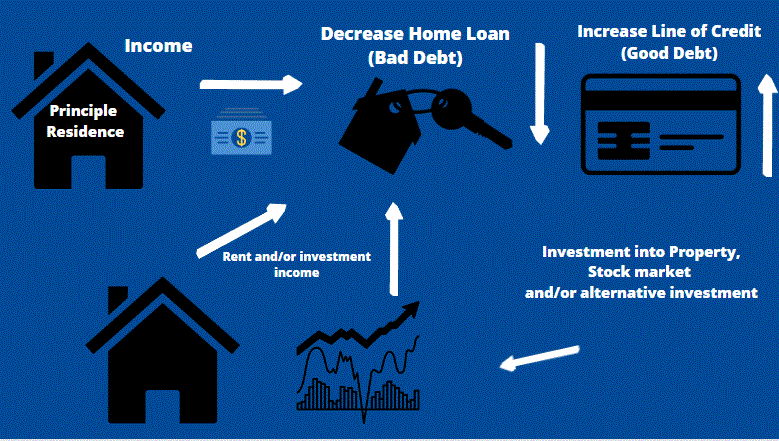Before we answer the question – what is debt recycling? We must first give a brief introduction to debt.
We separate debt into two types – tax deductible debt and non-tax deductible debt. When implemented into a financial strategy, tax deductible debt is generally regarded as a useful tool. We often refer tax deductible debt as good debt as it typically refers to using debt for productive investment purposes. Non tax deductible debt also refers to debt used for consumption purposes. Hence forth, it’s unlikely to generate any return from its use.
We use two common strategies in the management and reduction of our client’s debt. These strategies are debt consolidation and debt recycling. We discuss both of these strategies below.
Deductible vs Non-Deductible Debt
The Australian Taxation Office (ATO) states that tax deductible debt is where the interest on a loan is considered tax deductible. Investment loans are considered tax deductible. For interest to be tax deductible, the funds from the loan must be used for the acquisition of an income producing asset(s). Non-deductible debt is also known as bad debt and has a higher after-tax cost than deductible debt. As a result, we consider bad debts to be a mortgage on a principal place of residence, car loan, personal loan and credit card.
Debt Recycling vs Consolidation
We implement two common strategies of reducing debt for our clients. They are debt consolidation and debt recycling. Debt consolidation strategies involve multiple sources of deductible and non-deductible debt being rolled into fewer or one source of debt at a lower interest rate. Debt recycling is a strategy that converts bad debt, non-deductible debt, into good debt, deductible debt. A personal debt recycling strategy can assist individuals to pay off their non-deductible debt quickly. Debt recycling strategies can be used to create long-term wealth tax-effectively. We assist our clients by investing their borrowed funds into investment assets such as property and shares. Next, we use their surplus cashflow (or income generated) to pay down non-deducible debt.

In conclusion, debt consolidation and debt recycling have a number of benefits and risks that should be considered. For that reason, personal financial advice is the best way to ensure that your situation is optimized. You can learn more about implementing a personal debt recycling strategy by requesting a Complimentary Financial Assessment with a member of the United Global Capital advice team and also speaking to your mortgage broker or financial strategist.
GENERAL ADVICE AND PAST PERFORMANCE WARNING
This article has been prepared by United Global Capital Pty Ltd (ACN: 154 158 273, ABN: 25 154 158 273, AFSL: 496179).
This article contains general information only and is not intended to provide any person with financial advice. We do not take into account any person’s (or class of persons) investment objectives, financial situation or particular needs. This article should not be used as the basis for making any investment or financial decisions. United Global Capital Pty Ltd does not make any representation as to the accuracy, completeness, relevance or suitability of the information, conclusions, recommendations or opinions contained in this article (including, but not limited to any forecasts made). United Global Capital Pty Ltd or its directors, officers, employees, agents or advisors, accept no liability is for any such information, conclusions, recommendations or opinions to the fullest extent possible under applicable laws.
Anyone considering making any investment decisions based on the information contained in this presentation should note that past performance, target returns or estimates of returns is not a reliable indicator of future performance and actual results can vary significantly.




